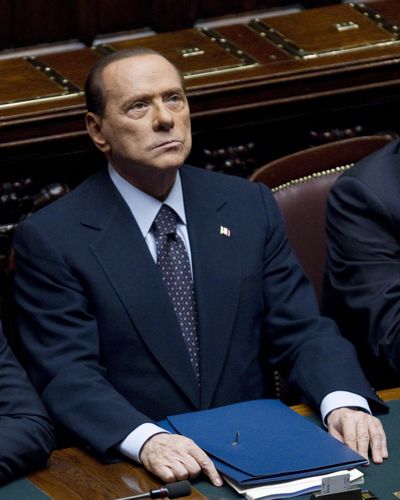Berlusconi’s government falls under debt pressure
Italy, eurozone trying to reassure investors

ROME – Italian Premier Silvio Berlusconi conceded Tuesday he no longer had the support to govern and announced he would resign like his Greek counterpart, becoming the biggest political casualty yet of the European debt crisis.
Berlusconi promised to leave office after Parliament passes economic reforms demanded by the European Union to keep Italy from sinking into Europe’s debt mess. He came to the decision hours after a vote on a routine piece of legislation made it clear he no longer commanded a majority in the lower Chamber of Deputies.
A vote on the reform measures is planned for next week, giving Berlusconi a few more days before his turbulent 17 years in public life – and a political era in Italy – draw to a close. Over the years, Italy’s political establishment watched as the media mogul survived sex scandals and corruption charges.
Both Italy and Greece are under heavy pressure to reassure financial markets that the 17-country eurozone is moving quickly to reduce crippling government debts before they break apart the monetary union and plunge the world into a new recession.
Wealthier European countries including Germany and France have already bailed out Greece, Ireland and Portugal.
But as the eurozone’s third-largest economy, Italy, with debts of around $2.6 trillion, is considered far too big for Europe to bail out, putting even greater pressure on the country’s leaders to reassure markets that Italy is willing and able to get its financial house in order.
The usually defiant Berlusconi acknowledged he no longer has a parliamentary majority and said he will step aside for the good of the country.
His resignation may not be enough. Political analyst Sergio Romano, in a front-page column in Corriere della Sera on Tuesday, warned that unless a clear program emerges in a post-Berlusconi era “the foreign observers will reach the conclusion that the end of the Berlusconi government does not necessarily mean the advent of a more credible, trustworthy government.”
Italy accounts for 17 percent of the eurozone’s gross domestic product. But a substantial part of its debt needs to be rolled over in coming months and years – the nation needs to raise $412 billion in 2012 alone – just as interest rates have been soaring.
Berlusconi last week took the humiliating step of asking the International Monetary Fund to monitor the country’s reform efforts in a bid to reassure markets. Today, a separate European Union monitoring mission is to begin work in Rome to review measures taken so far.
Once Berlusconi resigns, Italian President Giorgio Napolitano will begin political consultations to form a new government. The most widely discussed name to lead a government is Mario Monti, the former EU competition commissioner.
The developments capped a convulsive day in the markets and in Parliament. In a routine lower-house budget vote that became a test of Berlusconi’s support, the prime minister garnered 308 votes of approval and none against. But 321 deputies abstained, a tactic that laid bare Berlusconi’s shrinking hold.
Berlusconi’s margin was eight shy of the 316 votes he needs to claim an overall majority in the 630-member chamber.
“This government does not have the majority!” thundered opposition leader Pierluigi Bersani. “If you have a crumb of sense in front of Italy, give your resignation!”
As Bersani spoke, Berlusconi scribbled his options on a piece of paper. An AP photo showed he wrote “resignation” and also “eight traitors,” an apparent reference to former allies who had abstained.